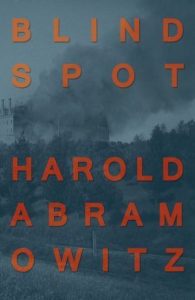 Blind Spot, by Harold Abramowitz
Blind Spot, by Harold Abramowitz
Review by Gretchelle Quiambao
There are novels that challenge your notions of conventional writing and there are novels that make you reflect on your own memories of past regrets and disappointments. Harold Abramowitz’s Blind Spot does both, all the while deliberately using language to create dynamic storytelling that leaves the reader eager to find out more about each character. Divided into three parts, the novel tells the stories of trauma and does so in a way that leaves readers anticipating more.
Abramowitz’s novel inspired me to look outside of what is to be expected and saw that syntax can be played with to creatively tell a narrative. Through repetition more is revealed about our characters’ thoughts and insights. The repetition also helps to develop a visual of the scenes in Abramowitz’s narrative, “The hotel was set in the mountains, set high in the mountains. The hotel was well known as a place to go for cures for one’s ills. The hotel was set atop a great mountain range, and he turned his head.” The Part I- Hotel was my favorite of the three narratives in the book because, to me, it was the most interesting and mysterious. Through a series of intersecting dreams and memories I was able to piece together the story of a character but still had room to interpret the narrative in my own way and be guided to create an ending for the character that still remains unknown.
Throughout the novel, I was constantly trying to decipher whether or not the narrator was reliving dreams or memories in the story. Figuring out what was truth was part of the mystery of the novel. As the narrator continued, more and more was revealed about the character’s true self, “He felt despair, real despair, and that, in and of itself, was something new, was enough to make him cry.” This novel was a display of life’s traumas and a reminder that dreams are often formed from our own desire to relive memories no matter how painful they may be. The stories made me self-reflect and forced me to confront the feeling of loss but at the same time feel consoled.
Through repetition and looping, I was able to get more insight into the state of the characters and build a relationship with the story. Although he is a truly detailed storyteller, Abramowitz also keeps enough information vague to have the reader relate to the narrative. This open ended storytelling allowed me to interpret the narrative for myself. Whatever might not have been resolved in his narration was for left me to complete.
The most interesting and exciting aspect of Abramowitz’s writing is his ability to use syntax in a creative way that does not distract from the narrative. I found his style poetic, stirring, and challenging. Through a series of syntactic looping and duplication we learn more about our characters’ reflections on the traumas that they have endured. This helped me to become more engrossed into the novel and kept me wanting to learn more. I wanted each repeated line to divulge more about their experiences and thoughts so that I could weave together the narrator’s story. For me, this novel truly highlights the use of language and syntax. Language structures becomes the star of this novel as you continue to read through and find that his syntactic loops become more apparent. The way Abramowitz uses language in his storytelling is one that few can emulate successfully.
I found Blind Spot to be a comforting and interesting novel about trauma that also displays how language can be fluid. The novel’s structure plays just as much of a role in the storytelling as the actual stories themselves. With each reveal of the narrator’s most in-depth thoughts, more connections and questions were resolved within the story. I found the novel to be not just an example of premier storytelling but a great display of how to play with language structures to entice your reader into your story. I felt myself jealous at Abramowitz’s ability to manipulate syntax to his advantage. He was able to create a compelling narrative by using unconventional structures in an effortless way.
This novel shows how poetry and narrative can come together in harmony. Abramowitz’s structure mimics the way in which we relive our own traumas, dreams, and memories. The repetition reminds us that there is comfort in thinking of the past and little resolve in trying to make sense of it all. In the most positive way, he reminds his readers about the traumas of everyday life and encourages them to embrace their own memories of loss and pain.
Blind Spot is now available through Civil Coping Mechanisms.
Gretchelle Quiambao is a writer and linguist based in Los Angeles.
